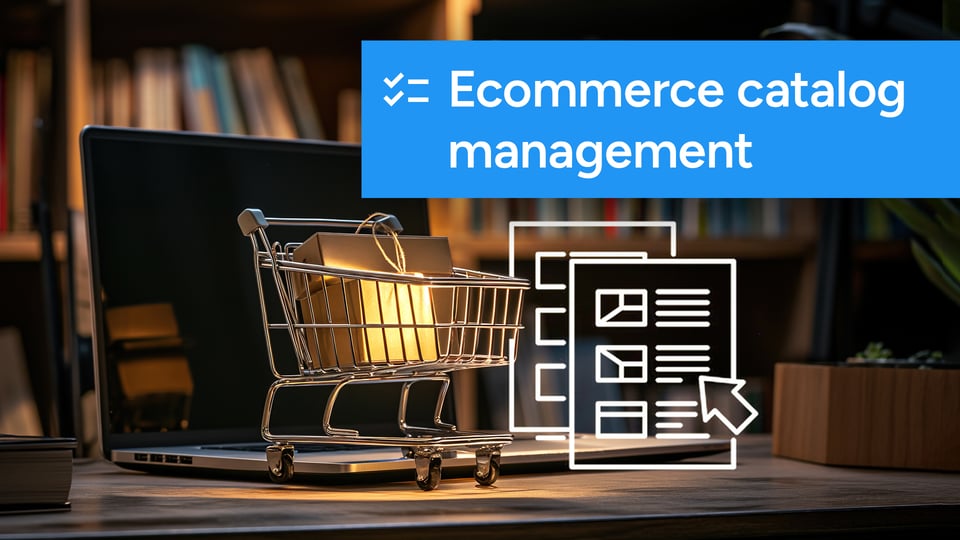While many factors contribute to success in the competitive world of ecommerce, accurate and reliable catalog management is fundamental.
Brands operating on ecommerce marketplaces must maintain accurate product data at all times. Up to 70% of consumers abandon a product page due to poor or incomplete product information. The most effective way to accomplish this is through a well-executed ecommerce catalog management strategy.
What is ecommerce catalog management?
Ecommerce catalog management is the systematic arrangement, maintenance, and optimization of a company's online inventory.
This includes product listings, categorization, and the maintenance of accurate and up-to-date information for potential buyers. The goal is to build a well-organized, user-friendly catalog that improves the customer experience.
Online shopping is going to keep growing and growing. If we look at the first quarter of 2023, in all but one country, Gen Z consumers preferred to do most of their shopping online rather than in-store. Mobile ecommerce is projected to reach $728.28 billion in 2025. Therefore, all retailers must have a robust product catalog, serving multiple channels to optimize the consumer experience.
Poor catalog data means missed income opportunities. A well-organized catalog, on the other hand, is a valuable tool for organizations, allowing for effective marketing across several platforms and widening the scope of product discovery—a critical aspect in generating sales conversions.
The importance of accurate catalog management in ecommerce
Effective catalog management plays a role in making sure accurate information is presented across channels, platforms, and Product Information Management systems. Key aspects of this are providing clear, detailed product listings that minimize customer confusion and emphasize the unique features of each item.
Well-structured catalogs include appropriate categories and subcategories, product descriptions, images, attributes, variations, key features, specifications, pricing, and related item suggestions.
When information is inaccurate, it can lead to customer frustration, increased returns, and negative reviews. On the other hand, ensuring that product details, features, and descriptions are precise and error-free helps build customer trust and loyalty, which in turn boosts sales for the business.
Common challenges:
Updating product listings
Inefficient product catalog management can turn updating listings into a frustrating and time-consuming process. Disorganized catalogs slow down workflows, making it difficult to implement timely product or price updates. To streamline the process, it’s essential to refine your management system so that changes can be made quickly and efficiently.
Managing multiple sales channels
A good catalog management system must accommodate multiple online platforms, such as Amazon, eBay, and others. Each platform has its own unique way of handling product categories and specifications. If your catalog data is incomplete or disorganized, adjusting it to fit each channel can become a lengthy task.
Integrating third-party data
In many cases, product data comes from external suppliers and isn’t generated by your business. This data might arrive in different formats or lack certain essential details. To ensure consistency and accuracy, catalog management processes must include cleaning and organizing this external data for smooth integration.
Expanding product offerings
Adding new products to your catalog can be especially challenging if your system is poorly structured. For growing businesses, this is a critical issue, as a disorganized catalog can limit how quickly and effectively new items are added, hindering overall growth.
Handling complex product structures
Some products come with additional complexities. For example, serialized items require unique identifiers for each unit, such as company vehicles. Additionally, products that come in various sizes, colors, or models need a catalog system capable of handling these variations efficiently. A well-managed catalog can accommodate these complexities, ensuring all items are properly organized and easily manageable.
Top tips for effective ecommerce product catalog management
Managing an ecommerce product catalog effectively has several challenges, including maintaining data accuracy and consistency, dealing with vast product databases, and negotiating the complexity of channel interaction. Businesses must also deal with digital asset management, variety and bundle structure, and competitive pricing strategy.
Addressing these challenges is critical to a seamless online buying experience and establishing customer trust, as well as maintaining efficient ecommerce operations for your brand.
Let's take a look at the top tips for overcoming ecommerce catalog management obstacles to set yourself up for success!
1. Customize your product catalogs
Different product categories require unique information. By tailoring your product catalogs across your online store and sales platforms, you can provide the right details for each type of product, catering to specific audience needs.
For example, clothing may need information on color options, size, fit, and country of origin, while lighting products require details on installation, brightness, and use cases. Our platform allows you to easily add, update, or remove SKUs through a centralized dashboard.
You can also optimize fulfillment by setting packaging preferences, establishing return protocols, and including customs details for international orders.
2. Maintain all your listings in a central hub
Efficiency is essential in catalog management. Businesses can centrally manage their product listings across multiple platforms using marketplace integration software.
Integration software enables synchronization of product information in your backend systems with what's displayed on your sales channels, removing the need for manual changes across multiple marketplaces. Businesses that centralize their catalog management processes can save time while ensuring uniformity and consistency in disseminating important product information.
Managing inventories, product content, orders, returns, and customer service for each channel independently creates many human tasks. Sellers frequently use spreadsheets to manage data, which they export in various formats. As you can imagine, this can be very messy, especially if you're selling on multiple marketplaces.
However, by using software like ChannelEngine, you eliminate the need for most of these steps. Everything can be managed from a single point.
This strategic approach improves operational efficiency and helps create a consistent and reliable customer experience across several digital touchpoints.
3. Ensure your technology stack is integrated
Integration serves as the foundation for effective catalog management. Businesses accomplish real-time data synchronization by directly connecting their Product Information Management (PIM) and Warehouse Management Systems (WMS) to sales channels.
Integrated ecommerce enables rapid changes, reducing the risk of mistakes and improving overall operating efficiency. The interconnectedness of PIM, WMS, and sales channels simplifies information flow, minimizing manual interventions and ensuring a synchronized product catalog. This direct alignment provides catalog accuracy and operational efficiency without the complexity of traditional data administration.
4. Use a warehouse management system (WMS)
A warehouse management system (WMS) consolidates inventory data and enhances supply chain visibility within your fulfillment centers. A WMS becomes especially vital as you scale to multiple warehouses. Our WMS system enables you to:
- Manage and organize SKUs.
- Add images and descriptions to improve order accuracy.
- Bundle products.
- Monitor inventory levels in real-time.
- Evaluate inventory performance across your distribution network.
- Rely on fulfillment and warehousing experts for retail and ecommerce needs.
With our platform, you can manage and update inventory seamlessly, adding detailed attributes and images to ensure fast and precise fulfillment.
5. Conduct regular inventory audits
Performing regular inventory checks guarantees that your online availability matches your actual stock levels. If an item is out of stock, updating your product listings prevents backorders or selling items that cannot be restocked.
Inventory management audits also reveal inefficiencies like overstocking slow-moving items or discovering inventory shrinkage when physical counts don’t align with your records.
6. Explore upselling opportunities
Product classification that is consistent across your catalog makes it easier to create compelling product bundles. When products have logical and established categorization, locating complementary items that can be bundled is easier.
Businesses can profit from upselling opportunities by systematically presenting complimentary items. This strategy is not just customer-friendly but also a calculated attempt to increase the average order value.
For instance, platforms like Amazon allow sellers to create bundles of multiple products, often at a discounted price compared to buying each item individually. Offering these bundles provides a compelling deal for consumers while boosting business sales.
Source: Amazon.com
Product bundling is the first feature in ChannelEngine's ecommerce management platform, which uses Generative AI. This technology uses advanced language models to create product titles and descriptions, saving time and enhancing your catalog. And, this strategy can be applied across all marketplaces, streamlining your upselling efforts.
Effective catalog management improves upsell potential by ensuring accurate, up-to-date product information, and helping customers make informed decisions. A well-organized catalog enhances the customer experience, increasing satisfaction and repeat business.
From a business perspective, efficient catalog management increases sales by streamlining product classifications and enabling real-time updates. It also saves time by standardizing data across platforms, reducing errors, and ensuring consistent product updates across channels.
Final words
Mastering ecommerce catalog management is critical for ecommerce retailers looking to succeed in a competitive market. From centralized listing control to seamless technological integration and creative product bundling, each component adds to a well-curated catalog that attracts and converts potential buyers.



.png?width=360&height=202&name=ecommerce%20predictions%202026%20(1).png)
